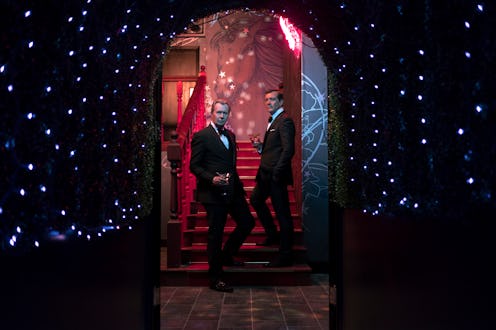Entertainment
Meryl Streep’s New Netflix Movie Was Inspired By A Global Tax Conspiracy

Coming to Netflix on Oct. 18, The Laundromat is a sprawling tale of wealth, greed, and fraud, tied together by two men and one law firm providing tax shelters and privacy for anyone avoiding accountability. The Steven Soderbergh film is filled with outlandish set pieces, liberal green screen usage, and fourth wall breaks, giving the entire film a comedic and often ludicrous tone. But The Laundromat is loosely based on a true story, even though plenty of artistic license is taken in the telling, .
In 2015, an anonymous whistleblower leaked over 11.5 million files — now known as the Panama Papers — to a German journalist. Siphoned from Panamanian law firm and "corporate service provider" Mossack Fonseca, the files exposed secretive offshore tax havens and the wealthy people who used them. Using shell corporations that existed only on paper, those people were able to shuffle and anonymize billions of dollars.
The Laundromat unravels this scheme by starting with a single thread: a tragic boating accident that drowns the husband of Ellen Martin (Meryl Streep). After the tragedy, she and the boating company try to sort out an increasingly complex shell game of assets and ownership. With no real answers to who's responsible, Ellen becomes obsessed with finding out for herself.
Streep's character and her ill-fated husband don't actually exist, but they represent some of the very real people hurt by these perfectly legal yet morally reprehensible tax setups. At one point, far down the rabbit hole, Ellen references Malta journalist Daphne Caruana Galizia's death by car bomb in 2017 when her daughter tries to downplay Ellen's anger. That really happened, less than a year after Galizia dug through the Panama Papers and alleged that the Maltese Prime Minister Joseph Muscat, along with other high-ranking officials, were hiding offshore wealth. (Muscat denied all wrongdoing, per NPR.) Though three suspects will stand trial, per the BBC, no one's yet been convicted of plotting her death.
Mossack Fonseca, the Panamanian law firm whose information was leaked, is real — or rather was real. Three years after their key role in this systematic tax evasion came to light, according to The Guardian, the company closed in March 2018, with just a skeleton crew remaining to answer legal questions.
Jürgen Mossack (played by Gary Oldman in the film) exists, as does his partner Ramón Fonseca Mora (Antonio Banderas). As fictionalized exaggerations of them narrate The Laundromat (in matching gold suits, no less) we're obviously hearing a biased version of events, but the events they're talking about really did occur. In the film, Mossack's explanation of how he ended up in Panama is skimmed over as family difficulties after "the war"; in reality, his father Erhard, who was a member of the Nazi party, was arrested by the Counter Intelligence Corps after WWII and offered to spy for the U.S., according to an FBI document requested by the International Consortium of Investigative Journalists (ICIJ).
The cinematic duo protest that everything they did was perfectly legal, and it matches the statement given to the press on their closing, per The Guardian: that they'd continue "fighting for justice" against accusations.
Then there are the cold-blooded actions of businesswoman Gu Kailai (Rosalind Chao), who is shown to be willing to poison a greedy collaborator who threatened her with blackmail. It might seem like a plot straight out of House Of Cards, but the real Kailai was convicted and sentenced to death for committing that exact crime, as well as more damning corruption charges, by the Chinese government, per another Guardian piece. In 2012, the sentence was suspended and commuted to life imprisonment, which may shrink down to 25 years if she continues performing well in her relatively cushy prison, per The Telegraph.
The Laundromat cheekily assigns an identity to John Doe, the whistleblower who exposed the whole rotten affair. While the movie's answer is sure to satisfy audiences, the Doe's actual identity remains unknown. The real whistleblower wrote a full manifesto about why they leaked the papers and explained that they couldn't reveal who they were as they feared for their lives.
As Oldman's Mossack says in the film's trailer, audiences should "think of this as a fairy tale that actually happened." But the real-life events behind The Laundromat are more like a scary story that's still being told.